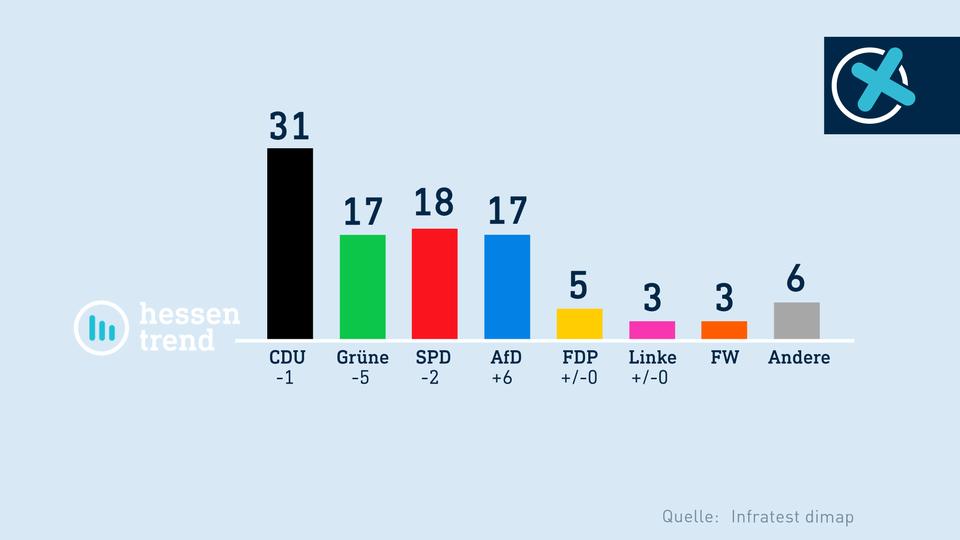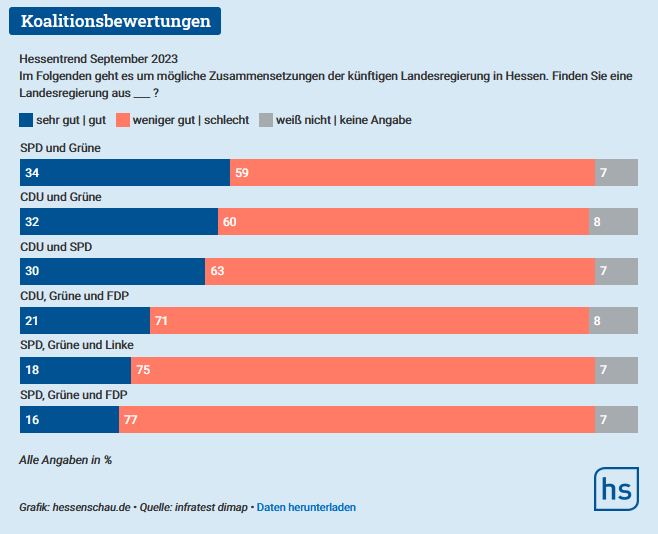On October 08, there will be two important federal state elections in the FRG. In both Hessen and Bavaria, the state parliament and thus a new government will be elected on this day. These state elections take place in the midst of a serious crisis of parliamentarism and the bourgeois parties within an economic crisis.
In the last state election in Hessen, a government under Black-Green was formed by a slim majority of one vote, continuing the coalition of the CDU and the Greens in Hessen. At the time, the CDU and SPD each lost more than 10 percent of the vote. Only the Greens and the AfD made larger gains in votes. However, this was with a turnout of just 67.3 percent, a full five percentage points lower than the previous state election in 2013.
Since then, voter turnout in the various state elections, such as in NRW, Bremen or Berlin, has continued to fall. And even otherwise, the situation in which this year's state election is developing is quite different from that in 2018 The last state election was before the economic crisis accelerated by the Corona pandemic, before the war of aggression by Russian imperialism on Ukraine and the inflation it drove, especially in the energy sector. Now the bourgeois parties are confronted with a situation in which the German economy is in contraction, as only today bourgeois economists announced. Just today, the forecast made at the beginning of the year that the German economy would grow by only 0.3 percent has been corrected and it has been established that the economy as a whole will shrink by - 0.6 percent in 2023. In addition, the real wages of the working class are falling because of the overall weak wage agreements of the unions, which do not even compensate for inflation, which on the one hand leads to lower purchasing power in the German domestic market and thus means less profit for the German bourgeoisie and on the other hand simply means mass impoverishment for our class.
Politically, these changed circumstances are expressed in the crisis of parliamentarism and the bourgeois parties. The federal government with the three traffic light parties(social democrats, the greens and the liberals) is not managing to handle the problems successfully and is slipping from crisis to crisis. This is also reflected in the opinions among the masses; according to surveys, 79 percent of the population is dissatisfied with the federal government, and a full 75 percent say the same about gangster boss Scholz. Meanwhile, the traffic lights coalition is trying to maintain and strengthen the competitiveness of the monopolies of German finance capital on the basis of their national industrial strategy, as can be seen, for example, in the Growth Opportunities Act, where the bourgeois state wants to subsidize, among other things, 15 percent of corporate funds for energy-efficient measures and ergo thus increased productivity of the monopolies. This is also expressed in the discussion about the industrial electricity price, where basically everyone from the traffic lights to Wagenknecht to the CDU agrees to protect the "industrial location Germany" and it is only a question of whether this should happen better with a cap on electricity prices or with tax relief on electricity. Meanwhile, the traffic light coalition continues to push the distribution of the burden of the crisis on the working class and the people, which can be seen in the cancellation of numerous social expenditures in the federal budget or in how at the state and municipal level the closure of social and cultural institutions are accepted for austerity measures. Another thing that all bourgeois parties have in common is the development of the reactionarization of the FRG. Thus, not a day passes in the bourgeois media by not trying to agitate against migrants and refugees and thus to set the public focus on the division into Germans and foreigners and that even without word contributions of the AfD. The child basic security which does not deserve its name comes now, does not apply however to refugee children. Even the Green Party leader Ricarda Lang now openly demands faster deportations and repatriation agreements. SPD Interior Minister Faeser announces, in addition to the stationary border controls at the Austrian border, "flexible" and "spatially" current border controls to Poland and the Czech Republic to prevent people from there can ask for asylum in the FRG. Friedrich Merz recently claimed that refugees can get their teeth done at the doctor's, while Germans would not get an appointment and Sarah Wagenknecht makes migrants and refugees responsible for the fact that Germans would not get social housing, daycare places and good education.
But even if there is unity between the bourgeois parties on important issues, the current economic and political crisis is also tearing open deep rifts between them in the struggle to grab the first place at the trough of parliamentary sources of power, money and influence.

According to current polls, only the AfD would gain six percent in the Hessen elections, while all other parties, especially the SPD and the Greens, would lose percentage points and the FDP would have to fear for its entry into the state parliament. The Left Party, which was represented in Hessen in the last state election by its Trotskyist federal chairwoman Janine Wissler, continues to stagnate at three percent and is in serious danger of being kicked out of the state parliament altogether. Since the CDU despite loss still holds the majority with 31 per cent, no traffic light coalition looms in Hessen. Which is certainly also because the FDP top candidate in Hessen Stefan Naas in relation to Hessen's acting green Minister of Economic Affairs Al-Wazir, calls himself an "Anti-Al-Wazir". This makes look deeply again like around the unity of the traffic light parties. The AfD would currently be able to make the race for second place, which would bring the CDU in the position either with a weakened SPD or a weakened Green Party to form a coalition. It is interesting to note at this point that the vast majority of the population of Hessen already rejects any form of possible coalition among the bourgeois parties, which shows that the new government is already rejected from the beginning by the masses, whichever it may be. This fact and the consequences of the election outcome for the various bourgeois parties, especially if the AfD should make a coalition increasingly difficult with further gains in votes, will mean even more contradictions for parliamentarism and the bourgeois parties.

Therefore, in this complex mishmash, it is all the more important to keep the strategic compass in mind in view of the elections. The elections in Hesse only serve the bourgeoisie in its attempt to establish an alleged legitimacy for its rule. Especially in times when this legitimacy is scratched in significant parts of the people and loses more and more ground, it is important to keep up the strategic importance of the election boycott and to use the bourgeois elections to draw a line between the bourgeoisie, its election circus for the legitimacy of its dictatorship and the working class and the people and to strengthen the masses in the fact that any exploitation and oppression cannot be voted out.
Cover and all other images from: https://www.hessenschau.de/politik/landtagswahl/hr-umfrage-zur-hessen-wahl-faeser-kommt-an-rhein-nicht-heran-afd-mit-gruenen-gleichauf-v2,ltw23-hessentrend-100.html










